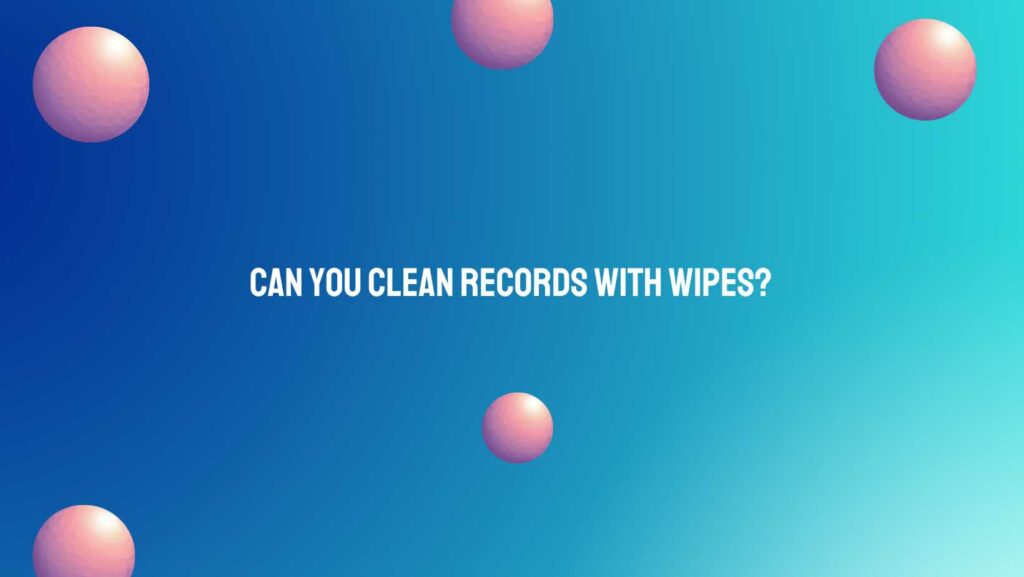Vinyl records have experienced a resurgence in popularity among music enthusiasts and audiophiles, offering a warm and nostalgic audio experience. Proper care and maintenance of vinyl records are essential to preserve their condition and sound quality. One common question is whether wipes, such as microfiber or lint-free wipes, can be used for cleaning records. In this comprehensive article, we will explore the feasibility of using wipes for cleaning records, potential risks, and benefits, as well as alternative cleaning methods to consider.
Understanding the Sensitivity of Vinyl Records
Vinyl records are delicate analog sound carriers, consisting of grooves that contain audio information. The grooves are sensitive and prone to damage from dust, dirt, and contaminants. Therefore, cleaning records is a crucial step in ensuring their longevity and optimal sound quality.
Using Wipes for Cleaning Records
Using wipes for cleaning records can be an effective and convenient method when done correctly. Here’s how you can use wipes for record cleaning:
- Choose the Right Wipe: Select wipes that are specifically designed for cleaning and are lint-free or microfiber. Avoid wipes that may leave lint or residues on the record’s surface.
- Dry Cleaning: For routine maintenance and dust removal, gently wipe the record’s surface using a dry lint-free or microfiber wipe. Wipe in a circular motion, following the direction of the grooves.
- Damp Cleaning: For more thorough cleaning, you can lightly dampen the wipe with distilled water or a homemade cleaning solution. The solution can be a mixture of distilled water and isopropyl alcohol (at a low concentration, typically around 10%). Wring out the wipe well to avoid excessive moisture.
- Wipe Carefully: Wipe the record’s surface gently, applying minimal pressure to avoid scratching or damaging the grooves. Follow the direction of the grooves from the center of the record toward the outer edge.
- Dry Thoroughly: After cleaning with a damp wipe, use a dry, lint-free or microfiber wipe to remove any residual moisture or cleaning solution. Ensure that the record is completely dry before playing it.
Benefits of Using Wipes for Record Cleaning
Using wipes for record cleaning offers several advantages:
- Convenience: Wipes are readily available and easy to use, making them a convenient choice for routine record maintenance.
- Effective Dust Removal: Dry wipes are effective for removing dust and surface contaminants, which can reduce pops and crackles during playback.
- Gentle Cleaning: When used correctly, wipes provide a gentle cleaning method that minimizes the risk of damage to the record’s grooves.
Potential Risks and Considerations
While wipes can be an effective cleaning tool for records, there are some potential risks and considerations to keep in mind:
- Residue: Some wipes may leave behind residues or lint on the record’s surface, which can affect sound quality. Be sure to choose wipes that are designed for cleaning and do not leave residues.
- Moisture Control: When using damp wipes, it’s essential to control the moisture level. Excessive moisture can damage the record or introduce mold and mildew risks.
- Proper Handling: Always handle the record with care, especially when cleaning. Avoid touching the grooves or the label area, as oils from your fingers can transfer to the record.
Alternative Cleaning Methods for Vinyl Records
If you are concerned about using wipes or prefer alternative cleaning methods, consider the following options:
- Record Cleaning Solutions: Commercially available record cleaning solutions are specifically formulated for vinyl records. These solutions are designed to effectively remove grime and contaminants without causing harm.
- Record Cleaning Brushes: Record cleaning brushes with fine bristles are excellent tools for dry cleaning and dust removal.
- Record Cleaning Machines: For serious audiophiles and collectors, investing in a record cleaning machine is an efficient way to deep-clean records and remove stubborn contaminants.
Conclusion
Cleaning vinyl records is an essential part of preserving their sound quality and longevity. Wipes, specifically designed for cleaning and lint-free or microfiber, can be a practical choice for record maintenance, offering convenience and effective dust removal. However, it’s crucial to handle records with care and avoid excessive moisture or residues. If you have concerns about using wipes, there are alternative cleaning methods, such as record cleaning solutions, brushes, and record cleaning machines, that can also effectively maintain the condition and sound quality of your vinyl records. Proper care and gentle cleaning ensure that your vinyl records continue to provide a high-quality listening experience for years to come.


